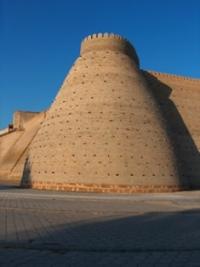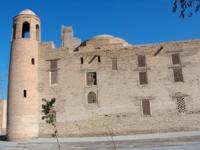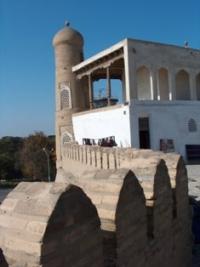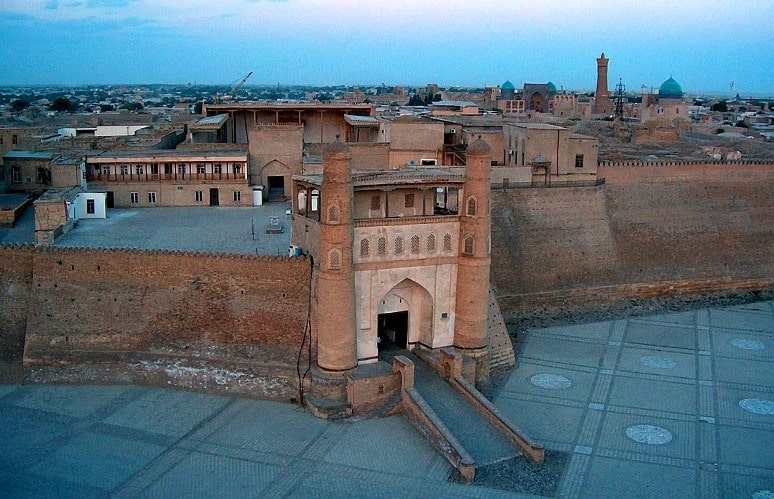You are here
Ark-citadel in Bukhara.



Tours on architectural ensembles and complexes of Bukhara.
“History almost always ascribes to individuals as well as governments more combinations than they actually had”
Anna Louise Germain de Stael.
Photo Gallery monuments of Bukhara.
Ark-Citadel is a residence of Bukhara khans. According to the last excavations, it was determined the citadel was on this place from IV century BC. For many years of building and destruction, 20 meters height artificial hill was formed; its upper layers were built over in the time of last bokharan emirs.
This is the core of the ancient citadel of Bukhara and the successive rulers of Bukhara-huddatov, sultans, emirs and khans. For two millennia, the cultural layers formed here a high platform on which the end of XVIII - early XX century.
Bukhara emirs were building new buildings and complement the old ones. The ancient city walls repeatedly donned new slip cases, clutches and linings, the last time they had the emirate's steep bevel edges, topped with scalloped parapets.
Sloping ramp (tahtapul) leads to an arched vault, over which stands a tall two-story columned volume with an open balcony to the drummers and trumpeters. Narrow covered passage (Dillon), on both sides of which are underground chambers and closet for detainees, displays in the front yard.
The surrounding office buildings separated by narrow street to the front side, where stood the palace of emirs. The core of her coronation was a yard, circled high columned ayvans, in the main aivan standing stone throne.
To the south of this courtyard is located the reception hall - mihmanhana Rahimkhan. In the Ark survived two mosques, the premises of some offices, but most of the buildings (the harem, warehouses, etc.) no longer exist.
Aesthetically, few buildings are notable arch; he retains an interest, not as an architectural complex, but as a historical monument. The wooden part of Ark building was burnt down during the fire of 1920.
The general planning is being reestablished by historical documents. Ark included the whole city, consisting of closely accreted houses; courts and yards with state institutions, emir, his wives, and relatives and officials lodgings.
Inside the trapeze form outlines of citadel walls the planning was right-angled with traditional cruciform crossing of main streets. Ark included: emir lodging, throe-room, police department, stables, stores of clothes, carpets, utensils, treasures, armoury, jail, jeweler’s and other workshops, mint place, mosques, mazars and other buildings.
The first, you can see it is massive fortress gates of Ark - portal with two-storey towers by sides from arch aperture and latticed architecture gallery on top. Behind it there is a musical pavilion, built in XVII century, two-coloured audience chamber, surrounded by gallery.
Here during a day there was performed a series of makoms - it is a musical work; through it people could know the time (it is tradition left from zoroastrizm time). From ayvan, tsarevitches was looking at solemnities and executions at Registan Square before Ark.
To citadel inside leads from Ark gates the gloomy, arched and raising up passage-dalon. By its side there can be seen 12 niches, leading to damp dungeons, where prisoners were lauguishing.
There were awful casemates and in dungeons under bridge of planks and Ark gates towers. To the south of entrance from the dalon, there is the most interesting of reserved monuments – throne-room of Bukharan emir, drawing room for ceremonies and festivals.
It was vast, brick-paved yard surrounded by ayvans on well-proportioned wooden pillars from 3 sides. On the long axis yard in deep ayvan there is emir throne. This marble “takht” dated to 1669, under painted, wooden canopy on fretted marble pillars, was made by Nuratian masters.

Authority:
V.G Saakov «History of Bukhara». Publishing house "Shark", 1996. «Bukhara. Masterpieces of the Central Asia». The historical guidebook across Bukhara. 2012. "Bukhoro. Bukhara" In the Uzbek, English and Russian languages. Publishing house "Uzbekistan", Tashkent 2000. Mukhammad Narkshakhi. History of Bukhara. Tashkent. 1897 (translator N.Lykoshina). V.G.Saakov "Architectural masterpieces of Bukhara. A Bukhara regional society "Kitabhon" Uzbek SSR, Exactly 1991 Robert Almeev. "History of ancient Bukhara". (Under edition of the Academician of the Academy of sciences of Republic Uzbekistan of Rtveladze E.V.)
Photos
Alexander Petrov.







